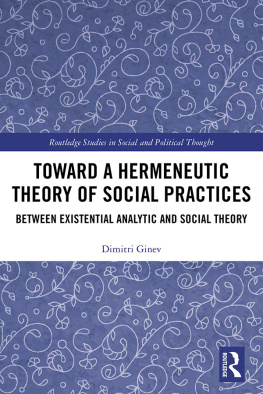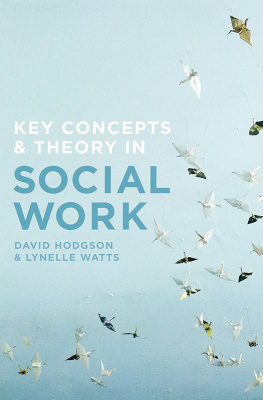Leonidas Tsilipakos - Clarity and Confusion in Social Theory: Taking Concepts Seriously
Here you can read online Leonidas Tsilipakos - Clarity and Confusion in Social Theory: Taking Concepts Seriously full text of the book (entire story) in english for free. Download pdf and epub, get meaning, cover and reviews about this ebook. year: 2015, publisher: Ashgate Publishing, genre: Politics. Description of the work, (preface) as well as reviews are available. Best literature library LitArk.com created for fans of good reading and offers a wide selection of genres:
Romance novel
Science fiction
Adventure
Detective
Science
History
Home and family
Prose
Art
Politics
Computer
Non-fiction
Religion
Business
Children
Humor
Choose a favorite category and find really read worthwhile books. Enjoy immersion in the world of imagination, feel the emotions of the characters or learn something new for yourself, make an fascinating discovery.

- Book:Clarity and Confusion in Social Theory: Taking Concepts Seriously
- Author:
- Publisher:Ashgate Publishing
- Genre:
- Year:2015
- Rating:3 / 5
- Favourites:Add to favourites
- Your mark:
- 60
- 1
- 2
- 3
- 4
- 5
Clarity and Confusion in Social Theory: Taking Concepts Seriously: summary, description and annotation
We offer to read an annotation, description, summary or preface (depends on what the author of the book "Clarity and Confusion in Social Theory: Taking Concepts Seriously" wrote himself). If you haven't found the necessary information about the book — write in the comments, we will try to find it.
Clarity and Confusion in Social Theory: Taking Concepts Seriously — read online for free the complete book (whole text) full work
Below is the text of the book, divided by pages. System saving the place of the last page read, allows you to conveniently read the book "Clarity and Confusion in Social Theory: Taking Concepts Seriously" online for free, without having to search again every time where you left off. Put a bookmark, and you can go to the page where you finished reading at any time.
Font size:
Interval:
Bookmark:
CLARITY AND CONFUSION IN SOCIAL THEORY
Philosophy and Method in the Social Sciences
Series Editor: Phil Hutchinson, Manchester Metropolitan University, UK
Engaging with the recent resurgence of interest in methodological and philosophical issues in the human and social sciences, this series provides an outlet for work that demonstrates both the intellectual import of philosophical and methodological debates within the social sciences and their direct relevance to questions of politics, ethics or policy. Philosophy and Method in the Social Sciences welcomes work from sociologists, geographers, philosophers, anthropologists, criminologists and political scientists with broad interest across academic disciplines, that scrutinises contemporary perspectives within the human and social sciences and explores their import for todays social questions.
Other titles in the series:
Wittgenstein among the Sciences
Wittgensteinian Investigations into the Scientific Method
Rupert Read, Edited by Simon Summers
Taking Concepts Seriously
LEONIDAS TSILIPAKOS
University of Edinburgh, UK
ASHGATE
Leonidas Tsilipakos 2015
All rights reserved. No part of this publication may be reproduced, stored in a retrieval system or transmitted in any form or by any means, electronic, mechanical, photocopying, recording or otherwise without the prior permission of the publisher.
Leonidas Tsilipakos has asserted his right under the Copyright, Designs and Patents Act, 1988, to be identified as the author of this work.
Published by
Ashgate Publishing Limited
Wey Court East
Union Road
Farnham
Surrey, GU9 7PT
England
Ashgate Publishing Company
110 Cherry Street
Suite 3-1
Burlington, VT 05401-3818
USA
www.ashgate.com
British Library Cataloguing in Publication Data
A catalogue record for this book is available from the British Library.
The Library of Congress has cataloged the printed edition as follows:
Tsilipakos, Leonidas.
Clarity and confusion in social theory : taking concepts seriously / by Leonidas Tsilipakos.
pages cm. -- (Philosophy and method in the social sciences)
Includes bibliographical references and index.
ISBN 978-1-4724-3240-7 (hardback) -- ISBN 978-1-4724-3241-4 (ebook) -- ISBN 978-1-4724-3242-1 (epub) 1. Sociology--Philosophy. 2. Social sciences--Philosophy. I. Title.
HM585.T76 2015
301.01--dc23
2014029208
ISBN: 978-1-4724-3240-7 (hbk)
ISBN: 978-1-4724-3241-4 (ebk-PDF)
ISBN: 978-1-4724-3242-1 (ebk-ePUB)
for Alexandra and Wes
To say that the social sciences are in a state of crisis is a worn-out clich. But so is to offer a theoretical programme that will allegedly transform them into genuine sciences or into forms of enquiry that really matter. In this book, instead of embracing either clich, I will try to provide partial though detailed evidence for a simple proposition, namely that the social sciences need to start taking concepts seriously. My effort and attention will focus on social theory.
The problem with social theory, as I see it, is not that it contains a number of empirically false doctrines. If that were the case one could hope that studies might eventually reveal that this, that or even most doctrines do not accord with the facts and need to be replaced by ones that do. The situation, I would like to suggest, is largely different. Social theory is in logical disarray: it is most centrally plagued by problems of reasoning and sense, problems having to do with its relation to the concepts that constitute its subject matter. Moreover, attempts at reconstruction end up reproducing the same problems as they are based on the same procedures and attitudes that are responsible for the logical incoherence. Accordingly, what one may hope for is that problems of logic will be recognised for what they are and given serious attention and that flawed procedures will be abandoned and the concepts involved will be handled appropriately.
This book is an attempt to demonstrate the force of that appropriately. In doing so it will make contrastive use of a revolutionary philosophical tradition which places concepts and the logic of language at centre stage and which can help us cultivate our logical sensibilities in a way that will open up alternative ways of proceeding.
Despite the fact that the present book deals with social theory, especially as the latter pertains to sociology, it is ultimately addressed to social scientists and to philosophers in the belief that they will all recognise the issues discussed herein as fundamental to the study of human beings living together and thus be able to relate them to their particular discipline and concerns with relative ease.
In the course of writing this book, not least because it began life as a doctoral thesis, I have incurred numerous intellectual as well as other kinds of debts.
The greatest debt of all I owe to Wes Sharrock who has guided me through my postgraduate studies over a period of five years and who continues to provide support and inspiration. I am exceptionally lucky to have found Wes who is a man of the rarest qualities, both academic and personal: his curiosity and understanding, his humility and kindness are all unmatched.
Michael Mair, Sivamohan Valluvan and Christian Greiffenhagen have been immensely valuable intellectual companions and friends. They have provided, each in their own particular yet equally generous way, judicious advice as well as numerous incisive observations on a plethora of subjects.
I owe a great deal to Phil Hutchinson, the editor of this series, who has shown extraordinary trust in my abilities and has repeatedly given me the opportunity to take part in stimulating seminars and conferences. For the latter I would also like to thank Rupert Read as for his willingness to supply reference letters at short notice. I am deeply grateful to them both for their support and confidence in me.
Luke Yates has been an exceptional conversationalist. I have benefited greatly from our not only disciplined but also caring discussions on numerous sociological questions and texts.
Steve Kemp has shown exceptional patience as well as open-mindedness in dealing with my thoughts and concerns. For his virtuous ways and for his benign overall guidance I am most grateful.
I have been fortunate enough to receive encouragement and support from various other colleagues at Manchester and Edinburgh, especially Irmak Karademir-Hazir, Bethan Harries and Heide Weishaar, as well as from my friends Alexandros Veloudis, Nikolia Kartalou, Nstor Saiz, Cristina Delgado and Rowann Bowcutt.
Isabelle Darmon and Carlos Frades reading group and long dinners have been sources of extreme pleasure and sometimes of frustration. I am grateful to them both for their generosity.
Thank you also to James Nazroo, Jeff Coulter, Patrick Watson, Chris Elsey, Paul Smith, Martin Cleary, Stephen Motrioni and to all those I may have neglected to mention. I hope they will forgive me.
I would like to thank publishers and journals for permission to use the following previously published material: is reworked from Theoretical procedures and Elder-Vasss critical realist ontology, Philosophy of the Social Sciences, doi: 10.1177/0048393112461055.
Wes Sharrock, Steve Kemp, Michael Mair and Marianthi Makri-Tsilipakou have read parts of the manuscript and offered comments and suggestions for improvements. Responsibility for the books errors, however, lies exclusively with me.
Last but not least, I am deeply grateful to my parents Marianthi and Christos and to my brother Odysseas for their unwavering support throughout the years. This book would not have been possible without them.
Next pageFont size:
Interval:
Bookmark:
Similar books «Clarity and Confusion in Social Theory: Taking Concepts Seriously»
Look at similar books to Clarity and Confusion in Social Theory: Taking Concepts Seriously. We have selected literature similar in name and meaning in the hope of providing readers with more options to find new, interesting, not yet read works.
Discussion, reviews of the book Clarity and Confusion in Social Theory: Taking Concepts Seriously and just readers' own opinions. Leave your comments, write what you think about the work, its meaning or the main characters. Specify what exactly you liked and what you didn't like, and why you think so.





